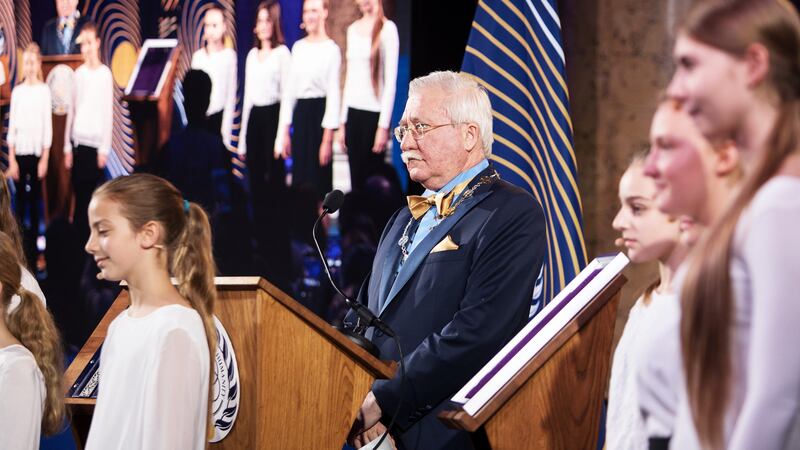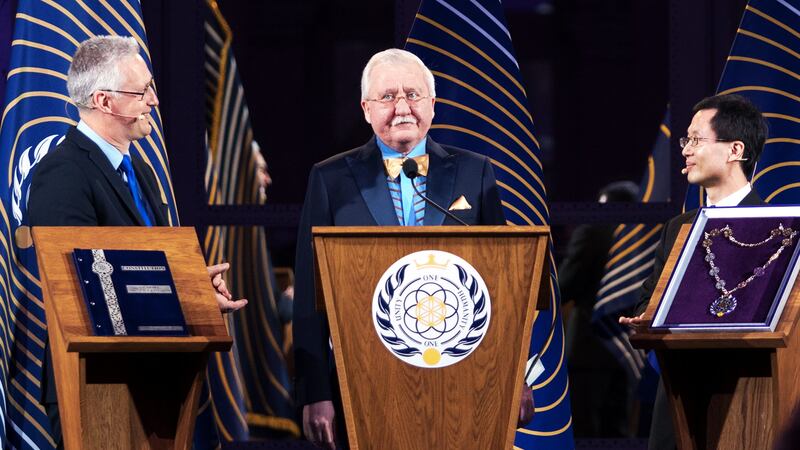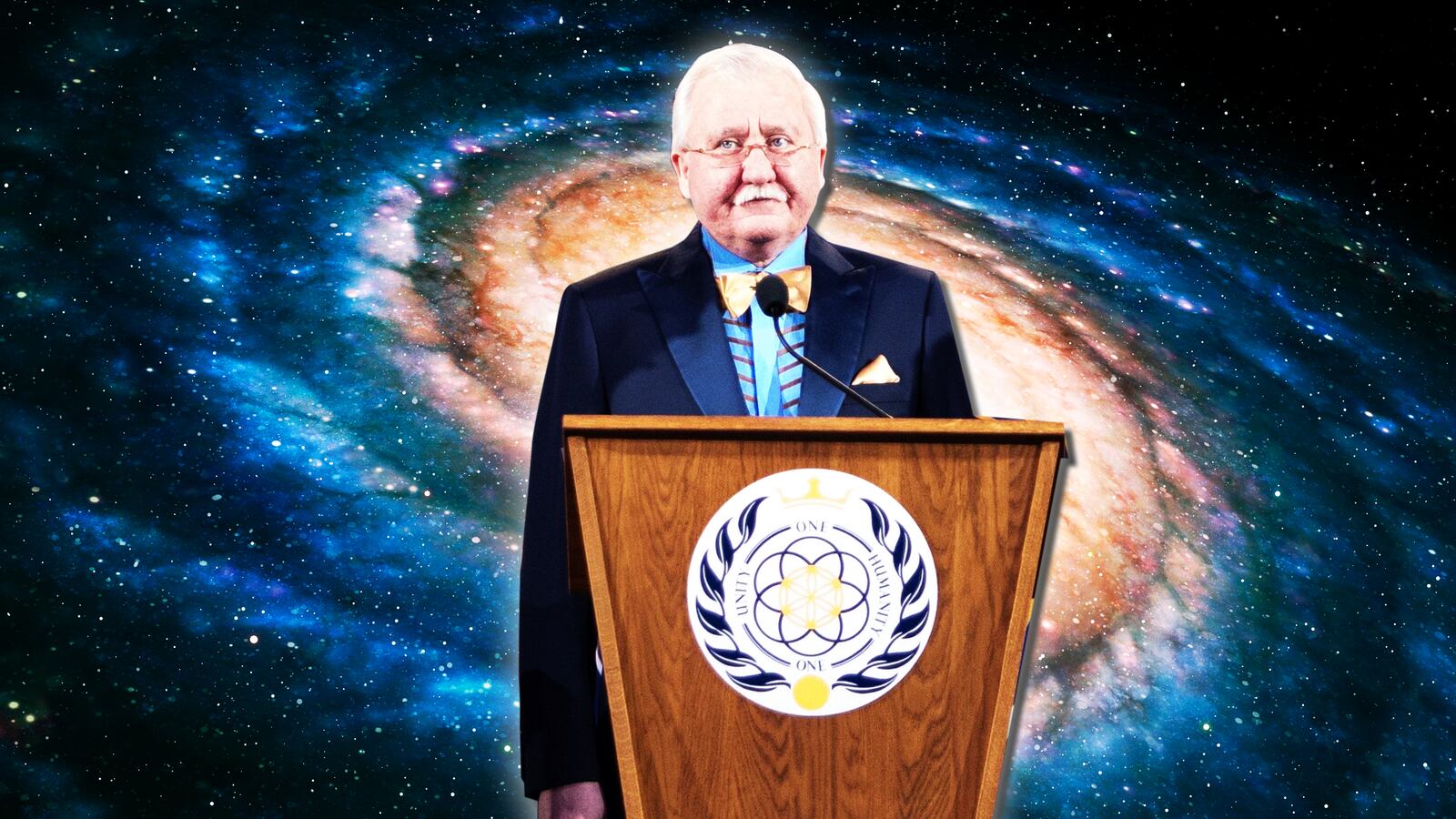Hundreds of people descended on the Hofburg imperial palace in Vienna, Austria, last Monday to inaugurate a head of state for a new space colony that doesn’t even exist yet: Asgardia.
“Now I can therefore declare with confidence that Asgardia, the first space nation of the united humankind, has been born,” Igor Ashurbeyli told attendees to his inauguration on Monday. “No matter what happens in the future, the greatness of this very first moment will never be forgotten.”
Named after the Norse legend of a city in the sky, the new space nation’s “citizens” had gathered in Vienna to earnestly, seriously take the first steps toward realizing a vision for sustainable, long-term life in space—like aboard Stanford torus or an O’Neill cylinder—where people lived and worked in orbit of the Earth, in total peace, without conflicts. If you asked any number of people who attended the inauguration if Asgardia was real, they’d have told you yes—this meeting itself was proof of that. Why else would they be here?

But is the Space Kingdom of Asgardia real? Asgardia was first announced by Russian-Azerbaijani scientist and businessman Igor Ashurbeyli in October 2016. To be fair, it meets some of the bare minimum requirements to be labeled as a country: citizens (over 200,000 from over 200 Earthbound nations, apparently); a 150-member parliament (which held its first session last Sunday, and is led by former British politician Lembit Öpik); a constitution (approved by 72.5 percent of the Asgardian vote through an online referendum); a coat of arms (a bizarre amalgamation of the UN emblem, the Rutherford model of the atom, and the U.K.’s royal coat of arms); a head of state (Ashurbeyli was formally inaugurated at Monday’s gathering); a calendar (13 months, to note the month Asgard between June and July); a national anthem (cannot believe they passed up Radiohead); and “territory” in the form of a data-storing cubesat, Asgardia-1, launched into orbit last November.
That’s about as far as Asgardia can go toward being a country, though. At best, Asgardia can be called a “micronation”—an entity that claims to be a sovereign, independent state but has no real working economy or community, and lacks formal recognition by most meaningful nations or international bodies.
Asgardia —as a project, not a country—is only about 20 months old. It’s “citizens” are people who basically filled out a form online and accepted the constitution. Its Minister of Parliaments basically filled out another form and ran in an online election (although had people known being an MP would mean going to Vienna and hanging out at the Hofburg, many more people probably would have applied). The Asgardia-1 satellite was deployed by a U.S. spaceflight company on a NASA-funded mission, which means the satellite technically falls under U.S. jurisdiction and is not exempt from the stipulations of the Outer Space Treaty.
In spite of these limitations, Monday’s affair was filled with about as much pomp and circumstance as a state affair for a small country might get. The Hofburg is not a cheap place to rent out—among the press junket covering the inauguration, there were rumors that it cost, at minimum, about $2 million just to rent out the space. Ashurbeyli decided to lavishly fill that space, with plenty of expensive food and booze, an orchestra that played in various iterations throughout the hall and during the main banquet, and an operatic performance of 15 songs played in the 12 most-spoken languages among Asgardia’s citizens (featuring dance performances to boot).
In other words, it’s the type of money you throw down in order to make a statement.
Money is perhaps the biggest mystery surrounding Asgardia. The inauguration notwithstanding, spaceflight is incredibly expensive, and there’s no question it cost at least a bit of chunk of change to get Asgardia-1 flown up into orbit. Launching and maintaining the Asgardia webpage, and flying and hosting the MPs for their first Parliamentary session: none of this is easy to do. I asked a pair of MPs—Christian from Austria, and Jan from Germany, where Asgardia was getting its funding.
Both demurred. “Igor is funding a lot of it himself,” Jan replied, with Christian adding rather tersely, “Donations, too!”

“Igor”—Ashurbeyli himself—was equally as mysterious, only saying that he was self- funding Asgardia through the end of this year.
He can certainly afford to. Born in 1963 to a wealthy noble family in Baku, Azerbaijan, Ashurbeyli went on to make a fortune by founding the software multinational Socium Holding in the late 1980s, and moved on to various high level positions in other Russian companies, like military R&D enterprise NPO Almaz.
What does he have to gain from all of this? In nearly all of his public statements, Ashurbeyli has said the purpose of Asgardia is to create a new, utopic community of peaceful existence.
Space provides the best opportunity to do so, Ashurbeyli rambled:
“You could think of it in terms of an opportunity that was there, but no one saw it or noticed it. No vacant space can survive. Nature does not tolerate vacancy. So you shouldn’t think of it in terms of it having been my decision. Maybe it was just pure intuition. The kind of boiling we see internationally, like in a water pot, with all the tensions, international conflicts—is so intense that the only place where you could release it is outer space. It appears the world will only continue to accumulate problems, so it’s not very likely they could be resolved on Earth. You need to go somewhere else. You need this release valve. So I think our timing for this idea was probably right, because a lot of people out there—maybe not as a conscious thing, maybe subconsciously — are already zooming in on the the thought that something has to be done.”
It’s safe to assume there’s something else going on here. A space paradise would be great, sure—but even if that were Asurbeyli’s ultimate goal, it’s going to take massive amounts of money to really get Asgardia going. A typical SpaceX Falcon 9 launch for a commercial payload, for instance, costs $65 million. That’s way cheaper than what spaceflight used to be, but still insanely pricey. Creating an entire nation in space, however it might look, will be one of the costliest endeavors ever.
So the project needs revenue. How is that going to work? In Ashurbeyli’s view, that’s not necessarily up to him. “My role in this is as an ignition mechanism for this engine, and the engine is expected to run on its own,” he said in typical fashion.
The Parliament will convene later this year to decide on a budget for next year, and that’s when they’re going to examine what kinds of areas for revenue are most worth pursuing. He was mum on what those revenue streams might actually look like.
But there are clues. Officially, Asgardia is represented by three different legal entities registered in Vienna. There’s Asgardia NGO, which is supposed to be where all of the projects civil servants work. There’s Asgardia International Research Center, which is supposed to be an R&D vehicle that sets Asgardia’s infrastructure up and helps it situate itself as a working nation. And there’s Asgardia AG, the investment arm that vies for funding to pour money into space startups and technology groups. It’s the latter two groups that will likely be used to find ways to generate a steady income for the project.
For example, among the thousands of different things Asgardia needs to do within the next few years, one of Ashurbeyli’s initiatives is to launch a series of satellites that can deliver global internet to Asgardia’s citizens on Earth (what Ashurbeyli referred to as Spacebook). That type of service might be something citizens buy into, and something that might even be opened up to the general world population. A venture like that will undoubtedly require partnering with various telecom businesses and working with governments to make this run properly—the same way a company like Facebook has done with its Internet.org intuitive.
The problem, obviously, is that the whole project is mired by a tone that makes it seem more like a strange club than a real organization. Christian laughed when we recounted that he basically became an MP by signing up online. Chris, an MP from Missouri and an emergency physician by trade, admitted that many MPs arrived in Vienna “with a healthy degree of skepticism. It was quite clear what were all supposed to be doing here.”
That doesn’t mean these people view Asgardia as a joke. On the contrary, they’re taking things about as seriously as you might expect they can. “Nobody thought Facebook could be this big 10 years ago,” he says. “Now look at it. Asgardia could go the same way. You have a lot of people here from all around the world, with a lot of big ideas.” Christian pointed out that Asgardia could be a big driver of innovations in currency, data storage, and other technologies that go well beyond just space travel — not a surprise, seeing that he’s a consultant for technology startups.
Marcus, an Asgardian citizen who works in Vienna, admitted he was a “naive utopian”—and that’s precisely what drew him to the potential of Asgardia in the first place.
Chris himself decided to bring his family out to Vienna for the inauguration, and he was glad he could show his children a community of people hailing from around the world, interested in talking about sometime as crazy audacious as a future in space. He said the “ah-ha!” moment for him came when his son began wanting to learn all the different languages being spoken around him, curious to figure out what everyone was fervently discussing and finding himself enthralled by the multilingual atmosphere.
To an outside observer, the multiculturalism was certainly a refreshing aspect to Asgardia. Hearing operating renditions of Hindi and Japanese and Broadway songs and even New York, New York; watching a large group get together for Hava Nagila; meeting people from all the continents of the world— it was clear Asgardia adhered to a strict code that welcomed people from all walks of life.
In talking with the MPs and simply watching them cruise through the room like social butterflies, I could understand why so many of them were so enthusiastic about being here: They felt like they were a part of building something special. Even the administrative business and meetings have an understated allure, because it’s where many people, whose voices don’t normally matter or carry weight in much of their day-to-day business, suddenly do matter. Creating bylaws, shaping the direction of a project from its inception, working with like-minded eccentrics who love to nerd out about space and technology and technocracy—it’s can feel exciting and surprisingly intoxicating.
But there’s a flip side to this that could hinder Asgardia as time goes on: the sheer absurdity of it. Can anyone really take watching people sing along to a national anthem for a nation you can’t even visit seriously? Is Ashurbeyli really a “visionary” as many MPs were saying, or just an eccentric with too much money and free time, maybe even a scammer? Virtually none of these people will actually get a chance to go to space, so what are they really devoting their time towards? And to what end?
In many ways, the ethos of Asgardia could be summed up by a line from its national anthem: “Leave the old problems all behind.” Like the obsession with going to Mars and beyond, Asgardia seems to be a hope that we’ll have a second chance at life, unencumbered by the mess we’ve made here. Whether that promise is real depends on whether you believe it—and in Asgardia—or not.






